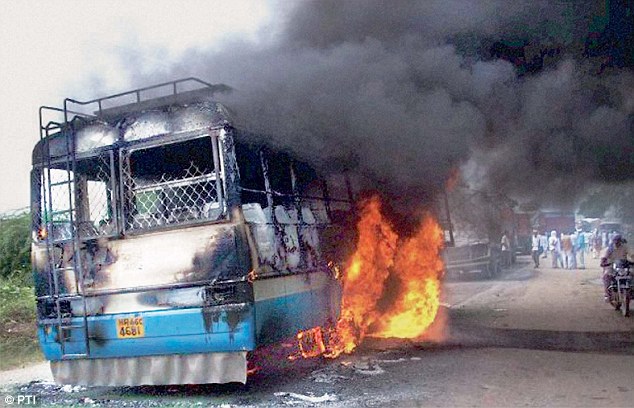
While consenting to hear petitions on supposed police abundances on students in Jamia Millia Islamia and Aligarh Muslim College, the Supreme Court Bench headed by Chief Justice of India S A Bobde on Monday communicated disappointment over revolting and obliteration of open property. The CJI said the dissidents were allowed to rampage, yet on the off chance that they did, they would not be heard by the court.
Regardless of law against the devastation of property, episodes of revolting, vandalism, and fire-related crime have been regular during fights the nation over.
What the Law Says
The Prevention of Damage to Public Property Act, 1984 punishes anybody "who submits fiendishness by doing any demonstration in regard of any public property" with a prison term of as long as five years and a fine or both. Arrangements of this law can be combined with those under the Indian Penal Code.
Public property under this act incorporates "any structure, establishment or other property utilized regarding the generation, dispersion or supply of water, light, power or vitality; any oil establishment; any sewage works; any mine or production line; any methods for public transportation or of broadcast communications, or any structure, establishment or other property utilized in association therewith".
Notwithstanding, the Supreme Court has on a few prior events found the law deficient, and has endeavored to fill the holes through rules.
In 2007, the court took suo motu awareness of "different occurrences where there was enormous scale pulverization of open and private properties for the sake of disturbances, bandhs, hartals and such", and set up two Boards of trustees headed by previous apex court judge Equity K T Thomas and senior supporter Fali Nariman to recommend changes to the law.
In 2009, on account of In Re: Demolition of Public and Private Properties v State of AP and Ors, the Supreme Court gave rules dependent on the proposals of the two master Advisory groups.
What the SC said
The Thomas Council prescribed turning around the weight of verification against dissenters. Tolerating the recommendation, the court said that the indictment ought to be required to demonstrate that public property had been harmed in a direct activity called by an association and that the charged additionally took an interest in such direct activity.
"From that stage, the weight can be moved to the denounced to demonstrate his guiltlessness," the court said. It included that the law must be changed to enable the court to draw an assumption that the blamed is blameworthy for wrecking public property, and it would then be available to the charged to disprove such an assumption.
Such an inversion of the weight of evidence is material in instances of sexual brutality, among others. For the most part, the law presumes that the charged is honest until the indictment demonstrates its case.
The Nariman Board's proposals managed to extricate harms for demolition. Tolerating the suggestions, the court said the agitators would be made carefully subject to the harm, and pay would be gathered to "make great" the harm.
"Where people, regardless of whether mutually or something else, are a piece of a dissent which turns fierce, brings about harm to private or open property, the people who have caused the harm, or were a piece of the dissent or who have sorted out it will be esteemed to be carefully obligated for the harm so caused, which might be surveyed by the standard courts or by any extraordinary strategy made to authorize the right," the court said.
Aside from holding agitators at risk and forcing costs, the court likewise gave rules including guiding High Courts to arrange suo motu activity, and to set up an apparatus to research the harm caused and grant remuneration any place mass decimation to property happens because of fights.
Effect of rules
Like the law, the rules as well, have had a restricted affect. This is on the grounds that the recognizable proof of nonconformists stays troublesome, particularly in situations where there is no pioneer who gave the call to dissent.
Following the Patidar tumult in 2015, Hardik Patel was accused of rebellion for actuating brutality that prompted death toll and property; in any case, Patel's legal advisors contended in Incomparable Court that since there was no proof that he had called for savagery, he couldn't be held at risk for loss of property.
In 2017, a candidate who guaranteed he had to go through over 12 hours out and about by virtue of a progressing tumult, moved the Preeminent Court looking for the execution of the 2009 rules. In its decision in Koshy Jacob versus Association Of India, the court emphasized that the law should have been refreshed — however it didn't allow the solicitor any pay since the coordinators of the dissent were not under the watchful eye of the court.

